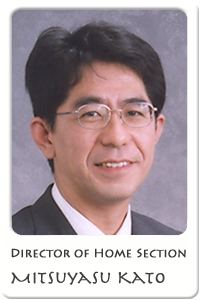

Top > Home >
Greetings > Messages from the chief of Home section
| ![]()
2008-2010 “Program for Enhancing Systematic Education in Graduate School”
Messages from the Representative of Home section in“Personalized Medical-Education Renaissance Program”
 In the Doctoral Program in Medical Sciences of University of Tsukuba, more than
30% of enrolled students are not medical school graduates. This proves a feature
in our valuable academic settings where the students with foundations in many
different areas including medicine, medical sciences, pharmacy, biology and
chemistry may conquer emerging issues by competing, discussing and cooperating
with each other.
In the Doctoral Program in Medical Sciences of University of Tsukuba, more than
30% of enrolled students are not medical school graduates. This proves a feature
in our valuable academic settings where the students with foundations in many
different areas including medicine, medical sciences, pharmacy, biology and
chemistry may conquer emerging issues by competing, discussing and cooperating
with each other.
We are now reorganizing the educational system to reflect these various types
of students’ backgrounds; a reform introducing a course system that specifies
a mission of each course, organizational development of curriculum corresponding
to its purposes and construction of student support system is in progress.
One of the features of our two Doctoral Programs of Medical Sciences is
“Musha-shugyo” study (samurai errantry) started in 2005. It is quite natural
for students to get actively involved with their research in the graduate school;
thus we have taken a step toward reorganization of educational curriculum in our
own policy regarding the establishment of active learning system as the most
focusing issue in the educational systematic background of unitary research.
Recently, the students who are awarded the doctoral degrees are pointed out
to have the following weaknesses:
・ acquainted with one’s field but poor in applied skills
・ unable to design and manage a research on one’s own
・ lack of relevant knowledge in one’s field
・ lack of communication skills (including language skills)
・ having strong academic mind
“Musha-shugyo” study is an active learning program in which the students propose
assignments by themselves and actively get involved to accomplish through discussion
with gradate students from abroad and people from industries. In addition to “substantiality”
and “comprehensibleness/reliableness” at the international standards, we consider
it as the best way to cultivate individuals in order to respond to strong demands toward the graduates.
1. Two Doctoral Programs of Medical Sciences: Medical Literacy
1) Establishment of Initiation Seminar
Initiation Seminar is not simply a guidance of the program or course, but it is an approach to specify one’s
position where you are heading to (temporarily) with the respect to other paths and to nurture a mind of
cooperation by properly recognizing the demands of society for the doctoral program graduates. It is
recommended for students to understand that the program is composed based on whether the clinical medicine
activity is involved or not (warp) and the course is designed based on career path of each students (woof).
2) Other newly established subjects
Aside from Initiation Seminar, there are several new subjects introduced this year including Special Studies on Medical Sciences and International Practice Medical Science to contribute to promote globalization, and Training in Medical Science Education for teaching experience.
2. Newly established 3 courses : Careers based on individuality
◇ Intensive Research Course
For those who deserve academic positions, research-minded personnel Clinical Research Course
◇ Clinical Research Course
For those who are able to progress Critical Path Research, specialists and medical professionals
◇ Public Research Course
For those international medical professionals who are able to respond to social needs with medical/medicine knowledge,
medical public officer and medical communicator, etc.
In addition to the above three courses, teaching fellowship (Intensive Research Course), systems for
clinical research assistant (Clinical Research Course) and organizer (Public Research Course) are also introduced
in order to support graduate students.
3. Dual Degree Program- doctoral (Medicine) and master’s (Public Health)
This is a program designed to cultivate clinical medicine researchers who contribute to develop clinical medicine
researches by effective use of statistical technique and also who hold both knowledge/skills in clinical medicine and
knowledge/research skills in public health. The program is also targeting to cultivate physicians who contribute to
develop public health and health management of local residents in organizations of health administration and medical care.
4. Establishment of Planning and Control for Medical Education in Graduate School
We have established Planning and Control for Medical Education in Graduate School (PCME) where planning and
assessment of the school and FD activity of faculty members take place.
Mitsuyasu Kato
Director of Home section